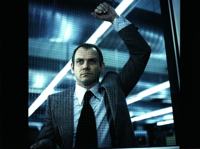 |
| |
Three Hours without Boredom
"World on a Wire" by
Rainer Werner Fassbinder (German National TV Station WDR, Oct. 14 + 16)
epd Rainer Werner Fassbinder clearly teaches the experienced producers of TV entertainment, crime serials and other pastime pleasures a lesson. Together with Fritz Müller-Scherz, he adapted Daniel F. Galouye’s science fiction novel. The result may disappoint Peter Märthesheimer, WDR’s dramatic adviser, who apparently expected something more connected to our society: “There is no message in this, no philosophy. This is much more a little game of thoughts and reflections”, argues the ambitious Märthesheimer. But this is exactly the point in Fassbinder’s two-part TV film about a confusing cosmos where each world turns out to be nothing but an electronic simulation of another world, which in turn, does not exist. In his attempts at social criticism, Fassbinder has, until now, hardly achieved more than precise images of petty bourgeois reality. Such works as “Katzelmacher”, “The Merchant of Four Seasons” or his TV-serial “Eight Hours Don’t Make a Day” only offer actionistic pseudo-solutions to problems. Therefore, had Fassbinder attempted social criticism or had he tried to bring his “message” across in this film, he would likely have failed.
In this work, Fassbinder, who almost continuously makes films, concentrates on what he does best, and what he already hinted at in his gangster movies: Luckily for this project, he has the TV-screen in mind, as he sets to work on his cinematic education and his ritualistic demonstration of any number of clichés attached to the story. After part one takes a somewhat pertinacious beginning, in part two Fassbinder accomplishes a level of atmospheric density and entertaining suspense rarely reached on German TV. This is true although his chosen genre is one we have never been able to deal with in this country: neither in literature nor on film or TV.
Everything works well together in this film: From the cast that cleverly mixes well-known names, old and new, to some nostalgic undertones such as the scene from Sternberg’s “Dishonored”. In the more than two hundred minutes we see a total commitment to a certain style, we encounter seemingly endless tracking- and pan shots, we feel a fashionable-melancholic tone and we come across sets that frequently mirror the scenes ad infinitum. It seems that this game about fantasy –that also manages to satisfy those who have higher standards – with its elements of entertainment and suspense was primarily made for relaxation purposes. We ought not to look at this achievement with arrogance. Instead one ought to praise the inherent precision, the accomplishments of the craft and the cinematic fantasy that are not to be confounded with simple routine. At the same time, one ought not to over-rate Fassbinder’s TV movie; despite some clever ingredients that are mostly ends in themselves, the fascination is short-lived. Conclusion: These roughly three hours spare us the usual, often mouse-grey boredom of TV.
Wolfgang Ruf
epd* / Kirche und Fernsehen No. 38, October 20, 1973 (*evangelischer Pressedient; Press Services of the Protestant Church)
back
|
|
|
 |